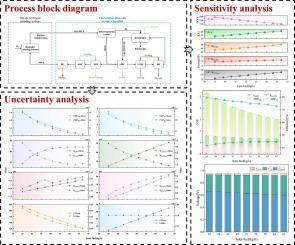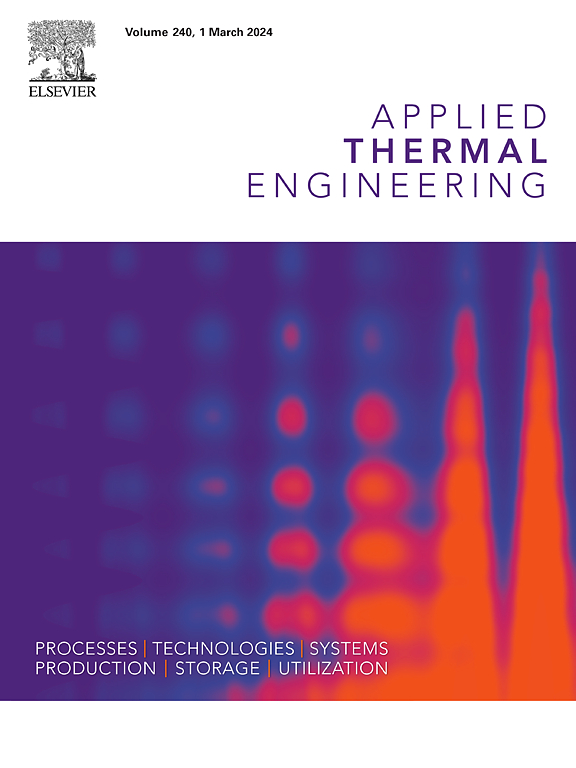Design and performance analysis of liquid organic hydrogen carriers supply HT-PEMFC systems
IF 6.9
2区 工程技术
Q2 ENERGY & FUELS
引用次数: 0
Abstract
This study proposes a novel multi-purpose system integrating liquid organic hydrogen carriers with high-temperature proton exchange membrane fuel cells. It innovatively couples the organic Rankine cycle, ammonia vapor compression refrigeration cycle, lithium chloride solution dehumidification cycle, and lithium bromide absorption refrigeration cycle to achieve multifunctional synergy in electricity generation, cooling, humidity control, and hot water supply. Based on Aspen Plus modelling, the system performance was evaluated across three dimensions: thermodynamics, exergy analysis, and uncertainty. Results indicate that under specified operating conditions, the system achieves net electricity efficiency of 41.79%, exergy efficiency of 79.72%, dehumidification rate of 85.1%, and coefficient of performance of 5.31 for the air conditioning and dehumidification system. The overall system energy efficiency stands at 1.6, demonstrating a significant advantage over existing research. In particular, the high-temperature proton exchange membrane fuel cell exhibits the highest exergy loss ratio, accounting for 62.3% of total losses. Uncertainty analysis indicates that among external parameters, fuel input volume exerts the most significant influence on system performance; internally, the exchange current density plays a dominant role. This research breaks through the primary limitation that the integration of liquid organic hydrogen carriers with proton exchange membrane fuel cells has been confined to automotive applications. It expands avenues for the high-value use of liquid organic hydrogen carriers, holding significant engineering application value for advancing the sustainable development of the hydrogen economy.

液态有机氢载体HT-PEMFC系统的设计与性能分析
本研究提出了一种将液态有机氢载体与高温质子交换膜燃料电池相结合的新型多用途系统。创新地将有机朗肯循环、氨蒸汽压缩制冷循环、氯化锂溶液除湿循环、溴化锂吸收式制冷循环耦合在一起,实现发电、制冷、控湿、热水供应等多功能协同。基于Aspen Plus模型,系统性能从热力学、火用分析和不确定性三个维度进行评估。结果表明,在规定运行条件下,系统净电效率为41.79%,火用效率为79.72%,除湿率为85.1%,空调除湿系统性能系数为5.31。整个系统的能源效率为1.6,与现有的研究相比具有显著的优势。其中高温质子交换膜燃料电池的火用损失率最高,占总损失率的62.3%。不确定性分析表明,在外部参数中,燃料输入量对系统性能的影响最为显著;在内部,交换电流密度起主导作用。本研究突破了液态有机氢载体与质子交换膜燃料电池的集成主要局限于汽车应用。拓展了液态有机氢载体的高价值利用途径,对推进氢经济的可持续发展具有重要的工程应用价值。
本文章由计算机程序翻译,如有差异,请以英文原文为准。
求助全文
约1分钟内获得全文
求助全文
来源期刊

Applied Thermal Engineering
工程技术-工程:机械
CiteScore
11.30
自引率
15.60%
发文量
1474
审稿时长
57 days
期刊介绍:
Applied Thermal Engineering disseminates novel research related to the design, development and demonstration of components, devices, equipment, technologies and systems involving thermal processes for the production, storage, utilization and conservation of energy, with a focus on engineering application.
The journal publishes high-quality and high-impact Original Research Articles, Review Articles, Short Communications and Letters to the Editor on cutting-edge innovations in research, and recent advances or issues of interest to the thermal engineering community.
 求助内容:
求助内容: 应助结果提醒方式:
应助结果提醒方式:


